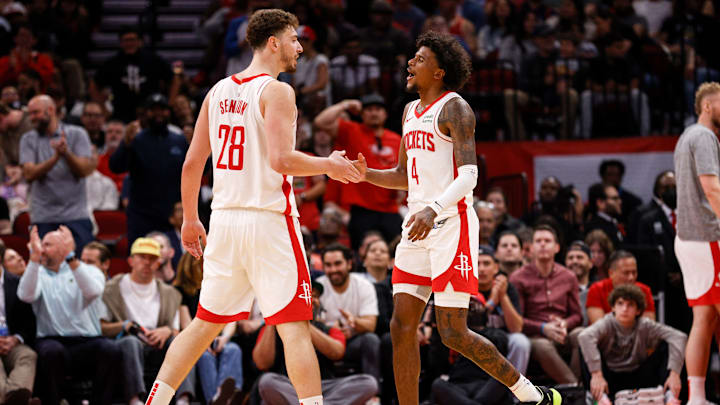The Houston Rockets waited until the last minute.
It felt like a safe operating assumption that Alperen Sengun and Jalen Green would not be extended. Sengun's cap hold would have been significantly smaller next season, and Green hadn't proven enough.
They've both been extended anyway.
This was a momentous day for the Rockets. We've got some newfound clarity about this team's direction. Green inked a three-year, $106 million deal with a player option in the third year. Sengun signed a five-year, $185 million contract.
Were these good decisions?
Jalen Green
Assessing Green's deal is complicated. For that matter, assessing Green is complicated.
His new deal has an average annual value (AAV) of $35 million. Green has not played like a $35 million player. Some will suggest that this is a bad contract by that simple logic.
That feels like an oversimplification. This is a remarkably short-term commitment. The vast majority of lottery picks either sign a max rookie extension or hit Restricted Free Agency (RFA). In fact, Green's deal is the first 2 + 1 rookie extension in NBA history.
So, the Rockets preserved some flexibility here. If Green continues to disappoint, it won't be long until the team is off the hook. In that scenario, they'd inevitably look to move him during that third year. Green would have some appeal on the trade market as an expiring contract.
Still, this deal isn't perfect by any means. The Rockets have removed the upside typically associated with a rookie extension. If a player's trajectory is positive, the fourth and fifth seasons of those deals tend to be especially valuable. By that stage of the player's career, it's feasible that they've reached superstar status, and even a rookie scale max extension isn't superstar money.
Again - this is a complicated deal for a complicated player. Rafael Stone deserves credit for finding an elegant solution to a problem, but Green remains a problem unless he steps his game up. If he does, and he earns a max extension in two years, the Rockets will be thrilled - but they won't be getting the surplus value you're supposed to get from a fifth-year superstar.
Grade: C+
Alperen Sengun
By contrast, this deal is simple:
It's very good.
Sengun's new pact has an AAV of $37 million. That's less than peers like Cade Cunningham, Franz Wagner and Evan Mobley.
So far, Sengun has been more productive than all of them.
That's not to say he's unequivocally the first overall pick in a 2021 redraft. Concerns about Sengun's defensive functionality in the postseason remain. Still, his production is undeniable. Now, his production-per-dollar rate is undeniable as well.
Sengun must have valued long-term flexibility. He must also be invested in the future of the Rockets. Why else would he take a below-market contract? Moreover, as in Green's case, this deal will be easy to move if the Rockets take a different direction.
Also like Green, Sengun has a player option in the final year of his deal. It's never optimal to sacrifice team control, but it's safe to assume that was the cost Stone paid to get Sengun at a discount. It was easily a cost worth paying.
Grade: A+
